| Listing 1 - 9 of 9 |
Sort by
|
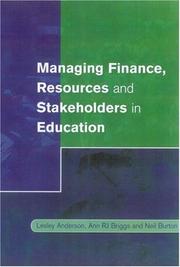
ISBN: 0761972595 0761972587 9780857026521 0857026526 9781446221082 1446221083 9780761972594 9780761972587 1282623389 9781282623385 9786612623387 6612623381 Year: 2001 Publisher: London SAGE
Abstract | Keywords | Export | Availability | Bookmark
 Loading...
Loading...Choose an application
- Reference Manager
- EndNote
- RefWorks (Direct export to RefWorks)
Written to aid students in understanding the theory and practice of managing finance, resources and stakeholders in schools and colleges, this reference text uses examples from abroad as well as from the UK.
School management --- Education --- School management and organization --- #SBIB:316.334.1O224 --- #SBIB:316.334.1O225 --- Administration, Educational --- Educational administration --- Inspection of schools --- Operation policies, School --- Policies, School operation --- School administration --- School inspection --- School operation policies --- School organization --- Schools --- Management --- Organization --- Finance --- Organisatie van het onderwijs: school --- Organisatie van het onderwijs: doelmatigheid, effectiviteit, efficiëntie --- Inspection --- Management and organization --- Finance. --- School management and organization. --- Universities and colleges --- Resource allocation. --- Allocation of resources --- Resources allocation --- Economics --- Operations research --- Planning --- Feasibility studies --- School finance
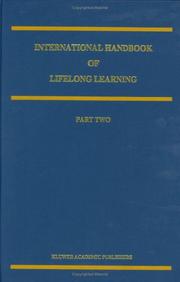
ISBN: 0792368150 9401038163 9401009163 Year: 2001 Publisher: Dordrecht Kluwer
Abstract | Keywords | Export | Availability | Bookmark
 Loading...
Loading...Choose an application
- Reference Manager
- EndNote
- RefWorks (Direct export to RefWorks)
Recent changes in the world effected by the transformations of information technology, globalisation, and the move towards a knowledge economy over the last thirty years have been as radical and fundamental as the changes resulting from the invention of the wheel and the printing press. We are now living in a new age in which the demands are so complex, so multifarious and so rapidly changing that the only way in which we shall be able to survive them is by committing to a process of individual, communal, and global learning throughout the lifespan of all of us. A number of international bodies and agencies have taken cognisance of these transformations and the demands they impose upon societies and communities of the twenty-first century and have developed and articulated policies intended to enable all citizens of the world in the twenty-first century to face these challenges. It is now a declared policy of many governments and international agencies that the only vehicle for such preparation is `education, education, education', and that preparing for the knowledge economy and the learning society of the future has to be a lifelong undertaking, an investment in the future that is not restricted merely to the domain of economic advancement but also to those of social inclusion and personal growth. Realising this, policy-makers across the international arena are grappling with the need to move from systems that emphasise education and training to the radically more unworked construct of lifelong learning. In this volume the editors and authors analyse, criticise, and rework the ideas, principles, and theories underpinning policies and programs of lifelong learning, re-interpreting them in the light of examples of `best practice' found in a range of educating institutions around the world. We believe that students of educational change and community development will find it useful and helpful to have available in this volume some of the most up-to-date thinking on the chief concepts, theories, and values of increasing policy interest in lifelong learning, together with a review of some significant examples of the different forms, focuses, and nexuses of thought and practice on this topic. All this enables us to offer some policy recommendations and practical suggestions as to ways forward in the endeavour to make lifelong learning a reality for all.
Adult education. Lifelong learning --- Education --- Social Sciences --- Theory & Practice of Education --- Continuing education --- Adult education --- Adult learning --- Education, Special Topics --- #PBIB:2002.1 --- Lifelong education --- Lifelong learning --- Permanent education --- Recurrent education --- Andragogical learning --- Adults, Education of --- Education of adults --- Volwasseneneducatie. Permanente vorming --- Learning --- Open learning --- School management and organization. --- School administration. --- International education . --- Comparative education. --- Lifelong learning. --- Adult education. --- Administration, Organization and Leadership. --- International and Comparative Education. --- Lifelong Learning/Adult Education. --- Education, Comparative --- Global education --- Intellectual cooperation --- Internationalism --- Administration, Educational --- Educational administration --- Inspection of schools --- Operation policies, School --- Policies, School operation --- School administration --- School inspection --- School operation policies --- School organization --- Schools --- Management --- Organization --- History --- Inspection --- Management and organization
Periodical
ISSN: 16823451 17269822 16096924 Year: 2001 Publisher: Paris
Abstract | Keywords | Export | Availability | Bookmark
 Loading...
Loading...Choose an application
- Reference Manager
- EndNote
- RefWorks (Direct export to RefWorks)
Higher education --- Universities and colleges --- Universités --- Administration --- Periodicals. --- Périodiques --- Administration scolaire. --- Enseignement supérieur. --- Politique éducative. --- 378.1 --- Onderwijsmanagement --- organisatie van het hoger onderwijs --- #ANTIL0204 --- Periodicals --- Arts and Humanities --- Education & Careers --- General and Others --- Arts and Humanities. --- General and Others. --- Administration. --- Universités --- Périodiques --- EBSCOASP-E EJEDUCA EJGESTI EPUB-ALPHA-H EPUB-PER-FT OECDILIB-E --- Educational administration --- Colleges --- Degree-granting institutions --- Higher education institutions --- Higher education providers --- Institutions of higher education --- Postsecondary institutions --- University autonomy --- Public institutions --- Schools --- Education, Higher --- Education. --- College administrators
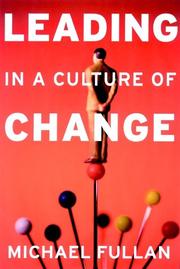
ISBN: 0787953954 Year: 2001 Publisher: San Francisco, Calif. Jossey-Bass
Abstract | Keywords | Export | Availability | Bookmark
 Loading...
Loading...Choose an application
- Reference Manager
- EndNote
- RefWorks (Direct export to RefWorks)
"At the very time the need for effective leadership is reaching critical proportions, Michael Fullan's Leading in a Culture of Change provides powerful insights for moving forward. We look forward to sharing it with our grantees."--Tom Vander Ark, executive director, Education, Bill and Melinda Gates Foundation. "Fullan articulates clearly the core values and practices of leadership required at all levels of the organization. Using specific examples, he convinces us that the key change principles are equally critical for leadership in business and education organizations." --John Evans, chairman, Torstar Corporation "In Leading in a Culture of Change, Michael Fullan deftly combines his expertise in school reform with the latest insights in organizational change and leadership. The result is a compelling and insightful exposition on how leaders in any setting can bring about lasting, positive, systemic change in their organizations." --John Alexander, president, Center for Creative Leadership "Michael Fullan's work is remarkable. He masterfully captures how leaders can significantly improve their learning and performance, even in the uncontrollable, chaotic circumstances in which they practice. A tour de force." --Anthony Alvarado, chancellor of instruction, San Diego City Schools "Too often schools and businesses are seen as separate and foreign places. Michael Fullan blends the best of knowledge from each into an exemplary template for improving leadership in both." --Terrence E. Deal, coauthor of Leading with Soul Business, nonprofit, and public sector leaders are facing new and daunting challenges--rapid-paced developments in technology, sudden shifts in the marketplace, and crisis and contention in the public arena. If they are to survive in this chaotic environment, leaders must develop the skills they need to lead effectively no matter how fast the world around them is changing. Leading in a Culture of Change offers new and seasoned leaders' insights in
onderwijsbeleid --- School management --- onderwijsmanagement --- onderwijsvernieuwing --- veranderingsmanagement --- Educational leadership. --- School management and organization. --- Educational change. --- Educational change --- Educational leadership --- School management and organization --- #PBIB:2001.4 --- Educational administration --- Inspection of schools --- School administration --- School inspection --- School operation policies --- School organization --- Schools --- Educational planning --- Management --- College leadership --- Education leadership --- School leadership --- Leadership --- Change, Educational --- Education change --- Education reform --- Educational reform --- Reform, Education --- School reform --- Educational innovations --- Inspection --- Management and organization --- Pedagogiek en onderwijskunde --- moderne schoolsystemen --- moderne schoolsystemen. --- Administration, Educational --- Operation policies, School --- Policies, School operation --- Education --- Organization
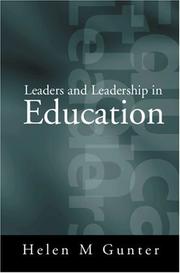
ISBN: 1446217558 1280369469 9786610369461 1412932297 9781412932295 9780761954927 0761954929 9780761954934 0761954937 9781446217559 0761954929 0761954937 9781280369469 6610369461 Year: 2001 Publisher: London Paul Chapman
Abstract | Keywords | Export | Availability | Bookmark
 Loading...
Loading...Choose an application
- Reference Manager
- EndNote
- RefWorks (Direct export to RefWorks)
In this up-to-date review of current approaches to leadership in education, Helen Gunter challenges readers to develop alternative ways of thinking about their own role in leadership and the impact it has on school effectiveness.
Educational leadership --- School management and organization --- Education --- Social Sciences --- Theory & Practice of Education --- Administration, Educational --- Educational administration --- Inspection of schools --- Operation policies, School --- Policies, School operation --- School administration --- School inspection --- School operation policies --- School organization --- Schools --- Management --- Organization --- College leadership --- Education leadership --- School leadership --- Leadership --- Inspection --- Management and organization --- #SBIB:316.334.1O225 --- #SBIB:316.334.1O271 --- #SBIB:316.334.1O272 --- 316.46 --- 316.46 Gezag. Leiderschap. Macht --- Gezag. Leiderschap. Macht --- Organisatie van het onderwijs: doelmatigheid, effectiviteit, efficiëntie --- Onderwijs: rol van het personeel: directie --- Onderwijs: rol van het personeel: leraars --- Educational leadership. --- School management and organization. --- Leadership.
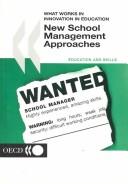
ISBN: 9264186468 9786610081752 1280081759 9264192530 9789264186460 Year: 2001 Publisher: Paris Centre for Educational Research and Innovation
Abstract | Keywords | Export | Availability | Bookmark
 Loading...
Loading...Choose an application
- Reference Manager
- EndNote
- RefWorks (Direct export to RefWorks)
Those who manage schools and educational systems today have an arduous task as schools everywhere are being asked to do more than ever before. They also face a complex world and seemingly endless pressures on resources and demands for better performance. How are schools and educational systems responding to these major challenges? What is the role of school managers within this new context? This book analyses those key questions, focusing on new school management approaches at the primary and secondary school levels. It is based on 29 innovative initiatives examined in nine countries: Flanders (Belgium), Greece, Hungary, Mexico, Japan, the Netherlands, Sweden, England (the United Kingdom) and the United States.
School management --- School management and organization --- Education and state --- Educational innovations --- Education, Elementary --- Education, Secondary --- #PBIB:2001.3 --- Children --- High school education --- High school students --- Secondary education --- Secondary schools --- Education --- High schools --- Elementary education --- Primary education (Great Britain) --- School children --- Educational administration --- Inspection of schools --- School administration --- School inspection --- School operation policies --- School organization --- Schools --- Educational planning --- Management --- Innovations, Educational --- Technological change in education --- Educational change --- Educational technology --- Education policy --- Educational policy --- State and education --- Social policy --- Endowment of research --- Education (Secondary) --- Education (Elementary) --- Inspection --- Management and organization --- Innovations --- Technological innovations --- Experimental methods --- Government policy --- Teenagers --- Administration, Educational --- Operation policies, School --- Policies, School operation --- Organization --- School management and organization - OECD countries - Case studies --- Education and state - OECD countries - Case studies --- Educational innovations - OECD countries - Case studies --- Education, Elementary - OECD countries - Case studies --- Education, Secondary - OECD countries - Case studies
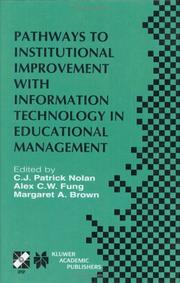
ISBN: 1280205784 9786610205783 0306470063 0792374932 Year: 2001 Publisher: New York, NY : Springer US : Imprint: Springer,
Abstract | Keywords | Export | Availability | Bookmark
 Loading...
Loading...Choose an application
- Reference Manager
- EndNote
- RefWorks (Direct export to RefWorks)
New Zealand schools have experienced unprecedented change during the lastdecade. Radicalrestructuringoftheframeworksforbothcurriculumand qualificationsfollowedamovementtowards self-managementin 1989. The curriculum framework, consisting of seven essential learning areas, has been progressively introduced with completionnotexpecteduntil 2002. Thenew Qualifications Framework, based on unit standards, was launched in 1994. The introduction of unit standards signalled an emphatic movement towards the use of internal assessment for awarding qualifications at the seniorsecondaryschoollevel. Eachcoursehadunitstandardsdefined,which described the outcomes and the performance criteria that would be used to determine whether or not the standard had been achieved. Approximately five to eight standards would be used for each full year course and each standard had a number of credits associated with it. The plan, which has since been modified, was for these credits to contribute to a National Certificate of Educational Achievement, at years 12 and 13, and other, subject specific, National Certificates. Secondary schools were faced with the task of recording and reporting 1 unit standardresults to theNew Zealand Qualifications Authority . This, by itself, was not a major issue as the significant suppliers of CSIS had modules availablewhichsatisfiedthis need. Atthistimeamodelwasbeingpresented to school audiences demonstrating how the recording, reporting and evaluation ofassessment data, relating to the curriculumframework, could be relatively straight forward IF there was a common assessment ‘currency’ across the school. This model was converted into software form for demonstration purposes.
School management and organization --- Information technology --- Data processing --- Education. --- Computer science. --- Information Systems. --- Multimedia systems. --- Educational Technology. --- User Interfaces and Human Computer Interaction. --- Management of Computing and Information Systems. --- Multimedia Information Systems. --- Educational technology. --- User interfaces (Computer systems). --- Management information systems. --- Multimedia information systems. --- Computer-based multimedia information systems --- Multimedia computing --- Multimedia information systems --- Multimedia knowledge systems --- Information storage and retrieval systems --- Informatics --- Science --- Computer-based information systems --- EIS (Information systems) --- Executive information systems --- MIS (Information systems) --- Sociotechnical systems --- Information resources management --- Management --- Interfaces, User (Computer systems) --- Human-machine systems --- Human-computer interaction --- Instructional technology --- Technology in education --- Technology --- Educational innovations --- Instructional systems --- Teaching --- Communication systems --- Aids and devices --- Administration, Educational --- Educational administration --- Inspection of schools --- Operation policies, School --- Policies, School operation --- School administration --- School inspection --- School operation policies --- School organization --- Schools --- Education --- Organization --- Inspection --- Management and organization --- Human-computer interaction. --- Electronic data processing --- Digital Education and Educational Technology. --- IT Operations. --- Management. --- User interfaces (Computer systems)
Periodical
ISSN: 14121131 25285750 Year: 2001 Publisher: Yogyakarta : Yogkarta : Program Studi Pendidikan Administrasi Perkantoran, Universitas Negeri Yogyakarta, Jurusan Pendidikan Administrasi, Fakultas Ekonomi, Universitas Negeri Yogyakarta
Abstract | Keywords | Export | Availability | Bookmark
 Loading...
Loading...Choose an application
- Reference Manager
- EndNote
- RefWorks (Direct export to RefWorks)
On office administration studies.
office administration --- administration --- office technology --- records management --- communication --- Office management --- School management and organization --- Education --- School management and organization. --- Office management. --- Education. --- Indonesia. --- Children --- Education of children --- Education, Primitive --- Human resource development --- Instruction --- Pedagogy --- Schooling --- Students --- Youth --- Civilization --- Learning and scholarship --- Mental discipline --- Schools --- Teaching --- Training --- Office administration --- Management --- Administration, Educational --- Educational administration --- Inspection of schools --- Operation policies, School --- Policies, School operation --- School administration --- School inspection --- School operation policies --- School organization --- Organization --- Inspection --- Management and organization --- Indonesia --- Dutch East Indies (Territory under Japanese occupation, 1942-1945) --- Dutch East Indies --- Endonèsie --- Indanezii͡ --- Indoneshia --- Indoneshia Kyōwakoku --- Indonesi --- Indonesya --- Indonezia --- Indonezii͡ --- Indonezija --- İndoneziya --- İndoneziya Respublikası --- Indūnīsīy --- Induonezėj --- Jumhūrīyah Indūnīsīy --- PDRI --- Pemerintah Darurat Republik Indonesia --- R.I. --- Republic of Indonesia --- Republic of the United States of Indonesia --- Republica d'Indonesia --- Republiek van Indonesi --- Republik Indonesia --- Republik Indonesia Serikat --- Republika Indonezii͡ --- Republika Indonezija --- Rėspublika Indanezii͡ --- RI --- United States of Indonesia --- Yinni --- Indanezii︠a︡ --- Indonesië --- Indonezii︠a︡ --- Indūnīsīyā --- Induonezėjė --- Jumhūrīyah Indūnīsīyā --- Republiek van Indonesië --- Republika Indonezii︠a︡ --- Rėspublika Indanezii︠a︡
Periodical
Abstract | Keywords | Export | Availability | Bookmark
 Loading...
Loading...Choose an application
- Reference Manager
- EndNote
- RefWorks (Direct export to RefWorks)
Education --- School management and organization --- Education and state --- Universities and colleges --- Education. --- Education and state. --- School management and organization. --- Administration --- Administration. --- Turkey. --- College administrators --- Administration, Educational --- Educational administration --- Inspection of schools --- Operation policies, School --- Policies, School operation --- School administration --- School inspection --- School operation policies --- School organization --- Schools --- Management --- Organization --- Education policy --- Educational policy --- State and education --- Social policy --- Endowment of research --- Children --- Education of children --- Education, Primitive --- Human resource development --- Instruction --- Pedagogy --- Schooling --- Students --- Youth --- Civilization --- Learning and scholarship --- Mental discipline --- Teaching --- Training --- Colleges --- Degree-granting institutions --- Higher education institutions --- Higher education providers --- Institutions of higher education --- Postsecondary institutions --- Public institutions --- Education, Higher --- Inspection --- Management and organization --- Government policy --- Anatolia --- Anatolie --- Ānātūl --- Asia Minor --- Asia Minore --- Bu̇gd Naĭramdakh Turk Uls --- Buturuki --- Cộng hoà Thỏ̂ Nhĩ K --- Dēmokratia tēs Tourkias --- Devlet-i Aliye Osmaniye --- Durka --- Durkka dásseváldi --- Gweriniaeth Twrci --- Jamhuri ya Uturuki --- Jamhuuriyada Turki --- Jumhūrīyah al-Turkīyah --- Komara Tirkiyey --- Lýðveldið Turkaland --- Lýðveldið Tyrkland --- Orílẹ̀-èdè Olómìnira ilẹ̀ Túrk --- Osmanlı İmparatorluğu --- Osmanskai͡a Imperii͡ --- Ottoman Empire --- Pobblaght ny Turkee --- Poblacht na Tuirce --- Repóbblica d'l Turch --- Repubbleche de Turchie --- Repubblica di Turchia --- Republic of Turkey --- Republic of Türkiye --- República da Turquia --- Republica de Turchia --- Republica de Turquía --- Republica Turcia --- Republiek Turkeye --- Republiek Turkije --- Republiek van Turkye --- Republik bu Tirki --- Republik Tierkei --- Republik Turkäi --- Republik Türkei --- Républik Turki --- Republik Turkia --- Republika e Turqis --- Republika ng Turkiya --- Repùblika Tërecczi --- Republika Turcija --- Republika Turcji --- Republika Turcyje --- Republika Turecko --- Republika Turkiya --- Republika Turkojska --- Republika Turska --- Republika Turt͡sii͡ --- Republiḳah ha-Ṭurḳiyah --- Republiken Turkiet --- Republikken Tyrkia --- Republikken Tyrkiet --- République de Turquie --- République turque --- Repuvlika de Turkiya --- Ripablik kya Buturuki --- Ripoliku Turkiyakondre --- T.C. --- Tagduda n Tturk --- TC --- Teki --- Tëreck --- Ṭerḳay --- Ṭerḳishe Republi --- Thekhi --- Thỏ̂ Nhĩ K --- Thú-ngí-kh --- Tiakei --- Tierkei --- Tiki --- Tirki --- Tırkiya --- Tirkiye --- Ti͡urk --- Ti͡urk Respublika --- Ti͡urkii͡ --- Ti͡urkii͡a Respublika --- Tlacatlahtocayotl Turquia --- Tʻŏkʻi --- T'ŏk'i Konghwaguk --- Tʼóok Bikéyah --- Torkėj --- Tȯrki --- Törkie --- Tȯrkii͡ --- Tȯrkii͡a Jȯmḣu̇rii͡ate --- Török Köztársaság --- Törökország --- Toruko --- Toruko Kyōwakoku --- Tourkia --- Tourkikē Dēmokratia --- Tturk --- Tu er qi gong he guo --- Tū-ī-g --- Tū-ī-gì Gê̤ṳng-huò-guók --- Tu'erqi --- Tu'erqi gong he guo --- Tu'erqi Gongheguo --- Tuirc --- Tunk --- Turch --- Turchia --- Turchie --- Turchy Respublikæ --- Turcia --- Turcija --- Turcijas Republika --- Turcja --- Turcland --- Turcyjo --- Turechchyna --- Turecká republika --- Turecko --- Tureke --- Turet͡ska Respublika --- Turėtskai͡a Rėspublika --- Tureuki --- Türgi --- Türgi Vabariik --- Türg --- Türgü Vabariik --- Turk --- Turkäi --- Turkaland --- Turkamastor --- Türkän --- Turkanʹ respubliksʹ --- Turkee --- Türkei --- Turkeya --- Turkeye --- Turki --- Turkia --- Turkia Respubliko --- Turkie --- Turkiet --- Turkii --- Tu̇rkii͡ --- Tu̇rkii͡a Respublikasy --- Tu̇rkiĭ --- Tu̇rkiĭė Respublikata --- Turkija --- Turkije --- Turkin tasavalta --- Turkio --- Turkiy --- Turkiya Republika --- Türkiyä Respublikası --- Turkiyah --- Turkiyakondre --- Türkiye --- Türkiye Cumhuriyeti --- Türkiýe Respublikasy --- Turkki --- Turkojska --- Turkowska --- Turkujo --- Turkya --- Turkyah --- Turkye --- Turqia --- Turquía --- Turquie --- Turska --- Turtchie --- Turt͡si --- Turt͡si Respubliki --- Turt͡sii͡ --- Turtsyi͡ --- Turukiya --- Tuykia --- Twrci --- Tyrkia --- Tyrkiet --- Tyrkland --- Tẏrt͡si --- Uturuki --- Vysokai͡a Porta --- Whenua Korukoru
| Listing 1 - 9 of 9 |
Sort by
|

 Search
Search Feedback
Feedback About UniCat
About UniCat  Help
Help News
News